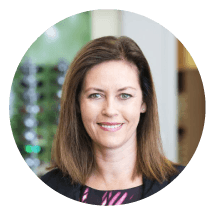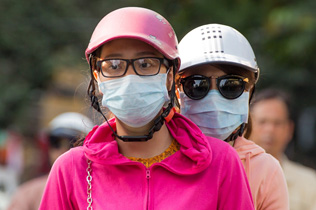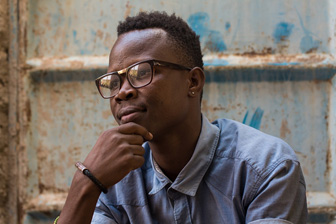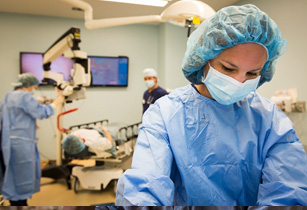A Journey in Optometry Around the World

Grassroots clinics and improved tertiary training bring optometry to underserved populations globally.

Uncorrected refractive error and cataracts are the leading causes of avoidable blindness throughout the world, but not everyone in every country has equal access to eye care. Rural and remote locations, lack of trained optometrists in some places, and cost of treatment and corrective lenses can prevent even simple interventions.
It’s estimated that about 90% of the world’s visually impaired people live in developing nations, which suggests a strong link between a country’s economic standing and its people’s eye health.
This month, we’re taking a look at some of the ways optometry professionals are working hard to bring sight and better care to some of the world’s most underprivileged people. From grassroots clinics to improvements in tertiary-level training, inspiring eye health stories can be found in many places.
Read on for a virtual world tour in optometry to India, Vietnam, Cameroon, Papua New Guinea and the Pacific Islands!
Bollywood stars help provide glasses for children
Earlier in 2020, the India Vision Institute conducted vision screening projects across impoverished areas of North India in collaboration with the Fred Hollows Foundation and Essilor’s Vision for Life. The ‘See Now’ campaign recruited the help of Amitabh Bachchan, one of the biggest stars in Hindi-language movies, to screen more than 30,000 children.
More than 1000 of these children were found in need of simple refractive lenses, but a lack of trained personnel across Uttar Pradesh state meant that most of the kids were receiving an eyesight test for the first time in their lives!
A new pair of glasses for children can mean the difference between success and failure in life: with better sight, they’ll be better able to complete their studies and participate in normal childhood activities.
Optometrists increasing exponentially in Vietnam!
 Just seven years ago, in 2013, only three qualified optometrists practiced in Vietnam: a country of 90 million people! An estimated 21 million Vietnamese required eye care but were unable to access an optometrist, and that’s no wonder when there were only three of them.
Just seven years ago, in 2013, only three qualified optometrists practiced in Vietnam: a country of 90 million people! An estimated 21 million Vietnamese required eye care but were unable to access an optometrist, and that’s no wonder when there were only three of them.
That all changed in late 2019, when the first graduating classes of optometry professionals graduated from the Hanoi Medical University’s School of Optometry and the University of Medicine Pham Ngoc Thach, established just a few years earlier. Hundreds more students are enrolled in optometry courses at these institutions and will become qualified over the next few years.
Hanoi Medical University is the largest and oldest university in Vietnam, established in 1902, and with its recent commitment to optometry, will be improving the lives of hundreds of thousands more Vietnamese.
New Doctor of Optometry degree offered in Cameroon
The World Health Organization estimates that around 1% of the population of the Central African country of Cameroon–or 240,000 people–suffer from blindness, about 80% of which could be avoided with better interventions.
 The Cameroon Association of Optometrists (CAO) has recently reached an agreement with Biaka University Institute of Buea for the training of eye health personnel. There was an extreme shortage of trained optometrists in the country, and the CAO had long been trying to convince a tertiary institution to train more eye health specialists.
The Cameroon Association of Optometrists (CAO) has recently reached an agreement with Biaka University Institute of Buea for the training of eye health personnel. There was an extreme shortage of trained optometrists in the country, and the CAO had long been trying to convince a tertiary institution to train more eye health specialists.
A seven-year Doctor of Optometry (OD) will be offered, to train high-quality health professionals in the eye care and visual system. The graduates will certainly help many of the 25 million population of Cameroon.
Lions to the rescue in Papua New Guinea
Back in 2016, the Lions Club International Foundation made a long-term commitment to the eye health of Papua New Guineans by funding the building of the Lions National Resource Centre for Eye Health in Port Moresby.
Such a centre was in dire need: statistics indicated that almost 30% of over-50-year-olds suffer from uncorrected vision impairment and blindness. The major causes of this are lack of correcting glasses and cataracts, both of which are easily treatable.
Over the years, the centre has become an eye-health hub in the developing nation by supporting comprehensive services, workforce development, spectacle distribution nationwide, and performing advocacy and health promotion.
Fred Hollows Foundation in the Pacific
 Some of our closest neighbours across the Pacific Islands would suffer from preventable sight loss were it not for the intervention of the Sydney-based Fred Hollows Foundation. Fred Hollows himself was a renowned eye surgeon and humanitarian, and his foundation continues his work.
Some of our closest neighbours across the Pacific Islands would suffer from preventable sight loss were it not for the intervention of the Sydney-based Fred Hollows Foundation. Fred Hollows himself was a renowned eye surgeon and humanitarian, and his foundation continues his work.
In the Pacific, the Fred Hollows Foundation provides cost-effective treatments for cataract and diabetes-related sight loss, works with governments and ministries of health, and provides thousands of pairs of glasses every year. They work in Papua New Guinea, the Solomon Islands, Vanuatu, Fiji, Tonga, Samoa and Kiribati.
The Fred Hollows Foundation recognises that restoring someone’s sight goes beyond ‘simply’ restoring vision: It’s an effective way of tackling poverty, as more children can go to school, and adults can go to work or start a business. The financial and social burden of eye health and related issues is reduced.
As these global examples show, we shouldn’t take for granted how easy it is for us here in New Zealand to pick up the phone and call our optometrist. Make sure you’re making good use of the excellent facilities available to you.
Visit Greenlane Penrose Optometrist to schedule your next check-up today.
Featured Posts
The History of Glasses
From “reading stones” to cutting edge technology – how history has shaped your spectacles. It’s hard to imagine a world without certain things. The internet, cellphones, cars … but imagine how differently we would experience all of these things if the humble...
Adapting to the new normal – with glasses
How to keep your glasses and eyes safe in a post-Covid world While we’re lucky in New Zealand to be relatively safe from the spectre of Covid-19, we still need to keep up the new health and hygiene practices as we transition to a safer way of living and working. Many...
Address
Cnr Great South Road & Rockfield Road, Greenlane 1051
Phone
09 525 1516
Hours
Mon to Fri: 9am – 5pm
Sat to Sun: Closed
Holidays: Closed


